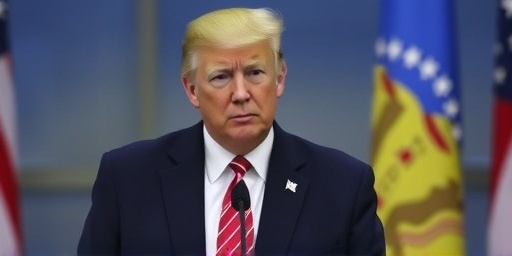In a stunning display of intra-party discord, top Senate Republicans, long known as Russia hawks, unleashed a fierce rebuke against President Donald Trump’s latest Ukraine peace plan, labeling it a dangerous concession that would embolden Russian aggression and jeopardize American and allied interests worldwide.
The criticism, led by Senate Minority Leader Mitch McConnell and echoed by other GOP stalwarts, came swiftly after Trump floated the controversial proposal during a recent White House briefing. Trump’s plan, which includes calls for Ukraine to cede control over Crimea and other eastern territories to Russia in exchange for a ceasefire, has ignited a firestorm within the Republican establishment. “This isn’t peace; it’s capitulation,” McConnell declared in a floor speech, his voice carrying the weight of decades of bipartisan consensus on countering Moscow’s imperial ambitions.
The backlash underscores deepening fractures in the GOP over foreign policy, particularly as the party grapples with Trump’s isolationist leanings amid ongoing U.S. support for Ukraine’s defense against Russia’s 2022 invasion. With over $175 billion in U.S. aid already committed since the war began, according to the Congressional Research Service, the Senate GOP‘s unified front signals potential roadblocks for any Trump-backed initiatives in a future administration.
McConnell’s Fiery Floor Speech Ignites GOP Pushback
Senate Minority Leader Mitch McConnell, a veteran of countless Russia-related battles, took center stage on the Senate floor Tuesday, delivering a pointed critique that reverberated through Washington corridors. Drawing on his experience as a key architect of sanctions against Vladimir Putin, McConnell warned that Trump’s Ukraine peace plan would “reward the very aggression that threatens the free world.” He cited the 2014 annexation of Crimea as a precedent, arguing that further territorial concessions would only invite more Russian incursions into Europe.
McConnell wasn’t alone. Senators Lindsey Graham of South Carolina and Marco Rubio of Florida, both prominent voices in the Senate GOP‘s hawkish wing, joined the chorus. Graham, who has visited Ukraine multiple times to bolster morale among its troops, tweeted, “Surrendering to Putin isn’t strength—it’s weakness that endangers our NATO allies.” Rubio, chair of the Senate Intelligence Committee, emphasized in a statement the intelligence community’s assessments that Russia’s hybrid warfare tactics would persist regardless of territorial deals.
This unified Senate GOP response marks a rare moment of cohesion against a sitting president’s foreign policy vision. Historically, McConnell has navigated tricky waters with Trump, but on Russia and Ukraine, his stance remains unyielding. Data from the Senate’s own records shows that GOP-led committees have approved over 90% of Ukraine aid packages since 2022, with McConnell personally sponsoring legislation that imposed crippling sanctions on Russian oligarchs.
Rewarding Aggression: Why the Plan Alarms National Security Experts
At the heart of the Senate GOP’s outrage lies the fear that Trump’s Ukraine peace plan effectively legitimizes Russia’s land grabs, setting a perilous precedent for global stability. Experts from think tanks like the Atlantic Council and the Heritage Foundation, traditionally aligned with Republican views, have piled on, describing the proposal as a “strategic blunder” that could embolden not just Putin but authoritarian regimes worldwide.
Under the plan’s outlines, leaked via anonymous White House sources, Ukraine would recognize Russian control over Crimea—annexed illegally in 2014—and parts of the Donbas region, in return for Moscow halting its military offensive. Critics, including Senate GOP members, argue this ignores the human cost: over 500,000 casualties reported by Ukrainian officials and the displacement of 6 million refugees, per United Nations figures. “We’re not just talking maps; we’re talking lives and sovereignty,” said Sen. Thom Tillis (R-NC), who serves on the Armed Services Committee.
National security implications extend beyond Ukraine. A Foreign Affairs analysis published this week warns that such a deal could fracture NATO unity, with Eastern European allies like Poland and the Baltics viewing it as a U.S. abandonment. Senate GOP leaders have invoked the 1994 Budapest Memorandum, where Ukraine relinquished nuclear weapons in exchange for security guarantees from the U.S. and Russia—guarantees now seen as broken. “Breaking faith here undermines every alliance we hold dear,” McConnell stressed, quoting from declassified State Department cables.
Statistics underscore the stakes: Russia’s economy, bolstered by $300 billion in frozen assets and redirected oil revenues, has shown resilience despite Western sanctions, according to IMF reports. Senate GOP hawks contend that easing pressure via a peace plan would allow Putin to rebuild his war machine, potentially targeting Moldova or the Arctic next.
Allied Fears Mount as U.S. Policy Shifts Under Trump
The ripple effects of Trump’s Ukraine peace plan are already being felt in European capitals, where leaders from the UK to Germany express private dismay over potential U.S. wavering. Senate GOP critics have highlighted how the proposal could strain transatlantic ties, with British Foreign Secretary David Lammy publicly stating that any deal rewarding invasion would be “unacceptable to free nations.”
In Brussels, NATO Secretary General Jens Stoltenberg has urged the U.S. to maintain its commitment, noting in a recent press conference that alliance spending on Ukraine defense has topped 2% of GDP for many members. Senate Republicans like Sen. Mitt Romney (R-UT), a vocal internationalist, have warned in op-eds that Trump’s approach risks isolating America. “Our allies are watching, and if we fold on Ukraine, who stands with us tomorrow?” Romney wrote in The Washington Post.
Contextually, this debate revives old GOP tensions. During Trump’s first term, Senate GOP pushed back on his Helsinki summit overtures to Putin, leading to the 2017 Countering America’s Adversaries Through Sanctions Act (CAATSA), which imposed penalties on Russia for election meddling and Ukraine incursions. Fast-forward to today, and the party is invoking those same principles. A recent Gallup poll shows 62% of Republicans still support Ukraine aid, a figure that Senate leaders are leveraging to counter Trump’s narrative.
Moreover, the plan’s domestic fallout includes bipartisan House support for tougher measures. Rep. Mike Turner (R-OH), chair of the House Intelligence Committee, echoed Senate sentiments, saying, “Trump’s peace plan ignores the reality on the ground—Russia’s atrocities demand accountability, not appeasement.” This cross-chamber solidarity could complicate Trump’s agenda if he seeks congressional buy-in.
GOP’s Long-Standing Russia Stance Faces Internal Test
The Senate GOP’s rebuke isn’t just reactive; it’s rooted in a decades-long evolution of the party’s posture toward Russia. From Ronald Reagan’s “evil empire” rhetoric to the post-Cold War sanctions era, Republicans have positioned themselves as Moscow’s fiercest U.S. foes. Trump’s Ukraine peace plan, however, tests this legacy, pitting his “America First” doctrine against traditional hawkishness.
Key figures like Sen. John Cornyn (R-TX) have drawn parallels to historical missteps, such as the 1938 Munich Agreement, where appeasement of Hitler led to greater conflict. “We’ve learned these lessons the hard way,” Cornyn said during a CNN appearance. Internal party dynamics add layers: while Trump’s base favors quick resolutions to foreign entanglements, surveys from the Chicago Council on Global Affairs indicate that 70% of GOP voters prioritize containing Russian influence.
Quotes from past Senate actions bolster the narrative. In 2022, McConnell co-authored a resolution affirming Ukraine’s territorial integrity, passing 113-3 in the Senate. Today, that resolve is being tested anew. Analysts note that Trump’s plan aligns with his past praise for Putin, including calling the invasion “genius” in early 2022—a remark that drew immediate Senate GOP condemnation.
Broader context includes economic angles: U.S. liquefied natural gas exports to Europe have surged 50% since the war, per Energy Department data, reducing reliance on Russian energy. Senate hawks argue that undermining Ukraine would reverse these gains, potentially hiking global prices and hurting American consumers.
Path Forward: Ukraine Aid Hangs in the Balance Amid GOP Resistance
As the dust settles from the Senate GOP’s sharp critique, the future of U.S. involvement in Ukraine remains precarious. With midterm elections looming and a potential Trump return in 2024, lawmakers are maneuvering to safeguard aid packages. The Senate Foreign Relations Committee, chaired by Sen. Ben Cardin (D-MD) but with strong GOP input, is slated to review supplemental funding next month, where Russia hawks plan to insert clauses blocking any peace plan concessions.
Looking ahead, experts predict intensified lobbying from Ukrainian President Volodymyr Zelenskyy, who has already scheduled virtual talks with McConnell. “We need America’s backbone now more than ever,” Zelenskyy posted on X, tagging Senate leaders. Bipartisan efforts could emerge, such as a proposed “Ironclad Ukraine Act” floated by Sens. Graham and Schumer, aiming to codify non-negotiable support.
Implications extend to global hotspots: a weakened U.S. stance on Ukraine might encourage Chinese assertiveness in Taiwan, per Pentagon assessments. Senate GOP members are pushing for hearings on these linkages, ensuring the party’s voice shapes the narrative. As Trump doubles down on his vision, the Senate’s resistance signals a pivotal moment—will the GOP reclaim its hawkish heritage, or yield to populist pressures? The battle lines are drawn, with U.S. security interests squarely in the crosshairs.








